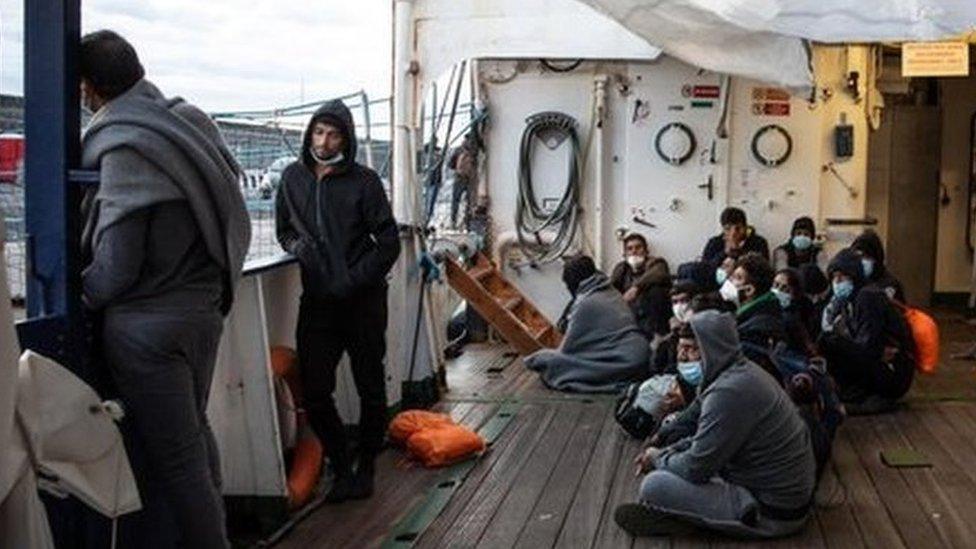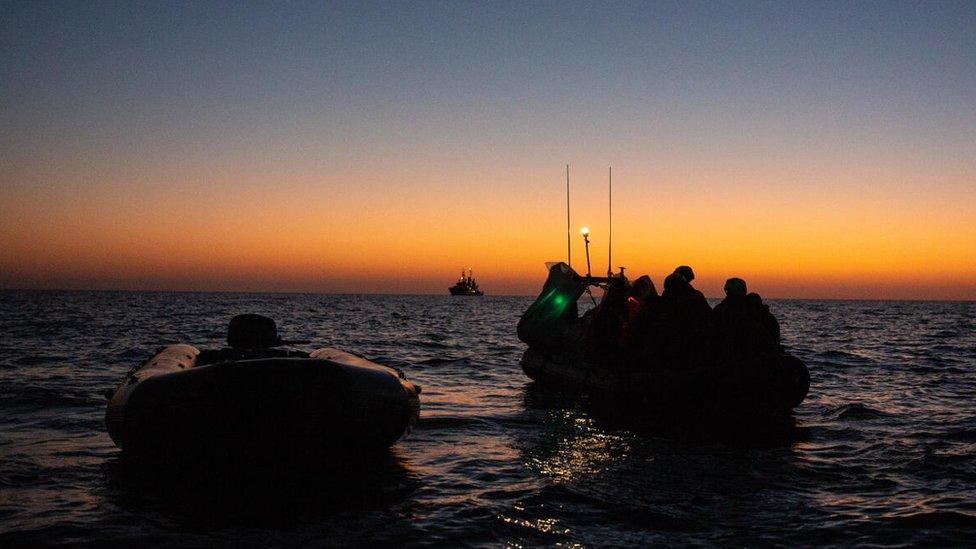Three leap from migrant rescue boat held in Italy
- Published
Watch: Migrant rescue boat still waiting for permission to dock in Italy
Three people have leapt from a migrant rescue boat where they were being held after being refused permission to disembark in Italy, the BBC has been told.
The three were among about 250 migrants refused permission to disembark after officials deemed them "healthy".
They were rescued by police, but it is unclear what will happen to them next.
Their bid to reach the shore came as Rome repeated its vow to halt migrant boats crossing the Mediterranean.
Prime Minister Giorgia Meloni used her maiden speech to MPs in late October to highlight the issue, saying she wanted to "stop the people traffickers from having the choice of deciding who enters Italy".
Far-right infrastructure minister Matteo Salvini told Italian radio on Monday it was not just people who were being trafficked in increasingly dangerous "organised trips", but weapons and drugs too.
Italy is one of the main entry points into Europe. Since the start of the year, 85,000 migrants have arrived on boats, external, according to the UN.
Migrants set sail in small, overcrowded boats from North Africa, often get into distress and are rescued by charity vessels.
Over the weekend, two rescue vessels docked in Sicily, carrying a large group of migrants. Most were allowed to leave the ships, but 35 men on the Humanity 1 and another 215 on the Geo Barents were told they would have to stay on board.
Italian Interior Minister Matteo Piantedosi argued that those who did not qualify as vulnerable would have to leave Italian waters and should be taken care of by the "flag state" of the ships in question - Germany and Norway respectively.
On Monday, cries of "help us" could be heard coming from the Geo Barents, which is being run by Médecins Sans Frontières (MSF), as it sat in the dock in Catania, Sicily.
Both boats - as well as two more which remain at sea - have reported that people are sleeping on floors and decks. They add that fever-inducing infections and scabies are spreading, while food and medical supplies are running low. Some migrants have been on the ships for more than two weeks.
In a joint statement issued on Monday, the UN's agencies for migration and refugees said the migrants must be "disembarked swiftly without any further delay".
"We call on states in the region to protect the lives of those rescued by ending the current impasse and offering a place of safety for disembarkation," the statement added.
The situation, according to the Geo Berants' team leader Anabel Montes Mier says, is becoming "unstable", with rising stress levels being compounded by the sight of land just "three metres away".
She confirmed that three people had jumped into the water before being rescued. An MSF spokesman said one of the men is believed to have jumped in order to help the two already in the water.
In particular, Ms Montes Mier said, there were concerns for the mental health of those on board.
"We have treated people with severe panic attacks, with anxiety attacks," Ms Montes Mier told the BBC. "We fear people might self-harm. We've had it in the past in situations less dire than this one, so this is our main concern."
The ships are now refusing to leave, despite threats from the Italian government of fines amounting to €50,000 ($50,000; £43,600). Both SOS Humanity, which runs Humanity 1, and MSF have argued that everyone on board their ships was vulnerable, as they had been rescued from the sea.
SOS Humanity has also announced it is taking the Italian government to court, alleging that a decree by an Italian minister, allowing the migrants to be kept on the ships, breaks both Italian and international law.
"Under international law, a search and rescue operation is concluded with the disembarkation of the survivors in a place of safety," explained Mirka Schäfer, SOS Humanity's advocacy officer, in a press release on Monday.
SOS Humanity is now appealing to the Administrative Regional Tribunal in Rome against the decree, as well as beginning "fast-track" proceedings in Catania itself, so that those remaining on board can have their asylum claims heard "on land".
The Italian government has yet to respond to the threat of legal action.
Related topics
- Published6 November 2022

- Published25 October 2022

- Published21 October 2022
